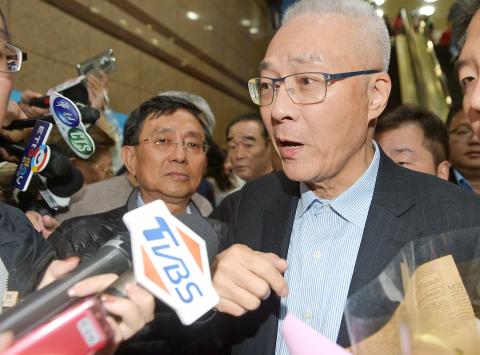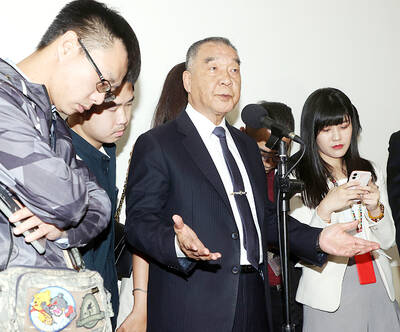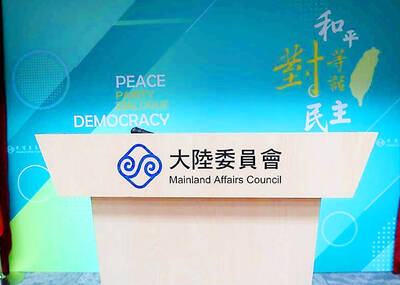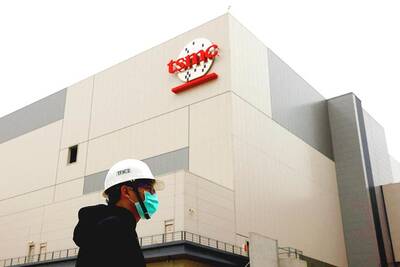Chinese Nationalist Party (KMT) Chairman Wu Den-yih (吳敦義) yesterday offered his resignation to the KMT Central Standing Committee, while the party listed in a report seven major reasons for its defeat in Saturday’s elections.
After Wu’s resignation, the committee appointed KMT Legislator William Tseng (曾銘宗) as acting secretary-general to oversee the party’s operations.
In the report, the KMT said the major factors in its defeat were that the “sense of the nation’s impending doom” (亡國感) was greater than “hatred toward the Democratic Progressive Party [DPP]”; the KMT could not control the discussion on cross-strait relations and respond to changes; “Internet armies” swayed public opinion, challenging candidates’ images and making it difficult for them to win over independent voters; the victory in Kaohsiung’s mayoral election could not be replicated and a mistake was made regarding the choice of campaign strategy; internal conflicts within the party, lack of unity and campaigning that could have been improved; the party’s list of legislator-at-large nominees did not meet public expectations; and the party was unable to win the favor of young people, who are highly engaged in politics.

Photo: Chang Chia-ming, Taipei Times
The report said that because Kaohsiung Mayor Han Kuo-yu (韓國瑜), the party’s presidential candidate, announced his candidacy less than six months after becoming mayor, his trustworthiness was questioned.
Han’s “repetitive” responses at the Kaohsiung City Council and failure to follow through on policy proposals, such as bringing Disneyland to the city, also raised questions about his capabilities, the report said.
His private life was put to the test, the report said, listing his verbal gaffes, “discriminatory” comments, illegal farmhouse and real-estate investments, as well as a photograph of him playing mahjong and his relationship with a woman surnamed Wang (王).
His “everyman” image was hurt, it added.
While Han’s every word and action was scrutinized, his campaign team was unable to respond with strong evidence in a timely fashion, it said.
The imprecision of the responses made his campaign vulnerable to his opponents’ attacks, it said.
His campaign “avoided” scrutiny by broadly saying that he was being smeared or “painted red” or “painted yellow,” the report said.
The DPP, along with media outlets and “Internet armies,” ran a smear campaign and created an image of Han as a caobao (草包, “country bumpkin”), it said.
This damaged Han’s efforts to win over young and independent voters, it added.
Young people care about various social issues, but the KMT’s stance on many of those issues is either at odds with young people’s views or is seen as conservative, the report said.
Chinese President Xi Jinping’s (習近平) proposal to impose a “one country, two systems” formula for Taiwan at the beginning of last year, as well as protests in Hong Kong, resulted in the success of the DPP’s strategic use of a “sense of the nation’s impending doom,” it said.
A case involving self-confessed Chinese spy William Wang Liqiang (王立強) further increased concerns about Chinese interference in domestic affairs, it said.
Although the KMT has a clear cross-strait policy, it has been unable to “adjust its pace” to changing situations, the report said.
Revisions to the party’s nomination process meant candidates with political influence were unwilling to participate, the report said, adding that after the party’s primary ended not all candidates supported Han, despite promises to do so.
The process of nominating at-large legislative candidates also hurt the KMT’s image, the report said.

LANDSLIDES POSSIBLE: The agency advised the public to avoid visiting mountainous regions due to more expected aftershocks and rainfall from a series of weather fronts A series of earthquakes over the past few days were likely aftershocks of the April 3 earthquake in Hualien County, with further aftershocks to be expected for up to a year, the Central Weather Administration (CWA) said yesterday. Based on the nation’s experience after the quake on Sept. 21, 1999, more aftershocks are possible over the next six months to a year, the agency said. A total of 103 earthquakes of magnitude 4 on the local magnitude scale or higher hit Hualien County from 5:08pm on Monday to 10:27am yesterday, with 27 of them exceeding magnitude 5. They included two, of magnitude

A total of 41 US military personnel were stationed in Taiwan as of December last year, a US congressional report said on Friday last week ahead of Tuesday’s passage of an aid package that included US$8 billion for Taiwan. The Congressional Research Service in a report titled Taiwan Defense Issues for Congress said that according to the US Department of Defense’s Defense Manpower Data Center, 41 US military personnel were assigned for duty in Taiwan. Although the normalization of relations with the People’s Republic of China (PRC) in 1979 included a vow to withdraw a military presence from Taiwan, “observers have indicated

NO RECIPROCITY: Taipei has called for cross-strait group travel to resume fully, but Beijing is only allowing people from its Fujian Province to travel to Matsu, the MAC said The Mainland Affairs Council (MAC) yesterday criticized an announcement by the Chinese Ministry of Culture and Tourism that it would lift a travel ban to Taiwan only for residents of China’s Fujian Province, saying that the policy does not meet the principles of reciprocity and openness. Chinese Deputy Minister of Culture and Tourism Rao Quan (饒權) yesterday morning told a delegation of Chinese Nationalist Party (KMT) lawmakers in a meeting in Beijing that the ministry would first allow Fujian residents to visit Lienchiang County (Matsu), adding that they would be able to travel to Taiwan proper directly once express ferry

Taiwan Semiconductor Manufacturing Co (TSMC, 台積電) on Wednesday said that a new chip manufacturing technology called “A16” is to enter production in the second half of 2026, setting up a showdown with longtime rival Intel over who can make the fastest chips. TSMC, the world’s biggest contract manufacturer of advanced computing chips and a key supplier to Nvidia and Apple, announced the news at a conference in Santa Clara, California, where TSMC executives said that makers of artificial intelligence (AI) chips will likely be the first adopters of the technology rather than a smartphone maker. Analysts said that the technologies announced on